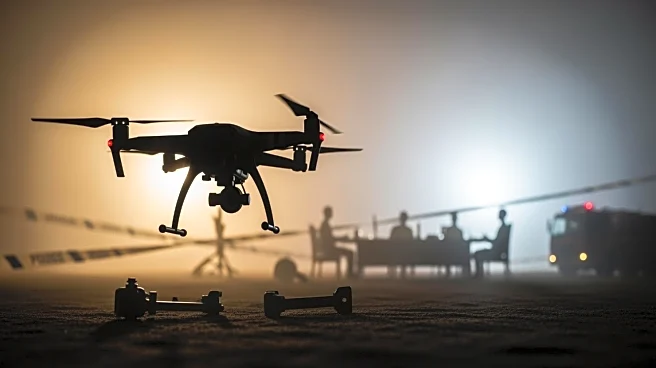What's Happening?
A Pakistani national has been sentenced to 40 years in prison for smuggling Iranian drone components to the Houthi rebel group in Yemen. The individual was part of a crew aboard the vessel Yunus, which
was intercepted by U.S. authorities. The crew claimed they were unaware of the true nature of their cargo, believing they were engaged in fishing activities. This incident highlights ongoing efforts by Iran to supply weapons to the Houthis, which is in violation of a United Nations Security Council resolution. The U.S. has been actively intercepting shipments of Iranian weapons intended for the Houthis, aiming to curb the flow of arms to the group.
Why It's Important?
The sentencing underscores the United States' commitment to enforcing international sanctions and preventing the proliferation of weapons to groups like the Houthis, which are considered terrorist organizations. This action is significant in the broader context of Middle Eastern geopolitics, where Iran's support for the Houthis is seen as a destabilizing factor. The interception of these shipments is crucial for maintaining regional security and preventing further escalation of conflict in Yemen. The U.S. aims to deter Iran's influence in the region and support efforts to bring stability to Yemen, which has been embroiled in conflict for years.
What's Next?
The U.S. is likely to continue its efforts to intercept illegal arms shipments to the Houthis, working closely with international partners to enforce sanctions against Iran. This may involve increased naval patrols and intelligence operations in the region. The sentencing may also serve as a warning to other individuals or groups involved in similar activities, potentially leading to heightened scrutiny and enforcement actions. Diplomatic efforts may be intensified to address the broader issue of Iran's support for the Houthis and to seek a resolution to the conflict in Yemen.
Beyond the Headlines
The case raises ethical and legal questions about the responsibilities of individuals involved in smuggling operations, particularly when they claim ignorance of their cargo's true nature. It also highlights the challenges faced by international law enforcement in distinguishing between legitimate and illicit activities in regions plagued by conflict. The long-term implications of continued arms smuggling could further complicate peace efforts in Yemen and exacerbate humanitarian issues.










